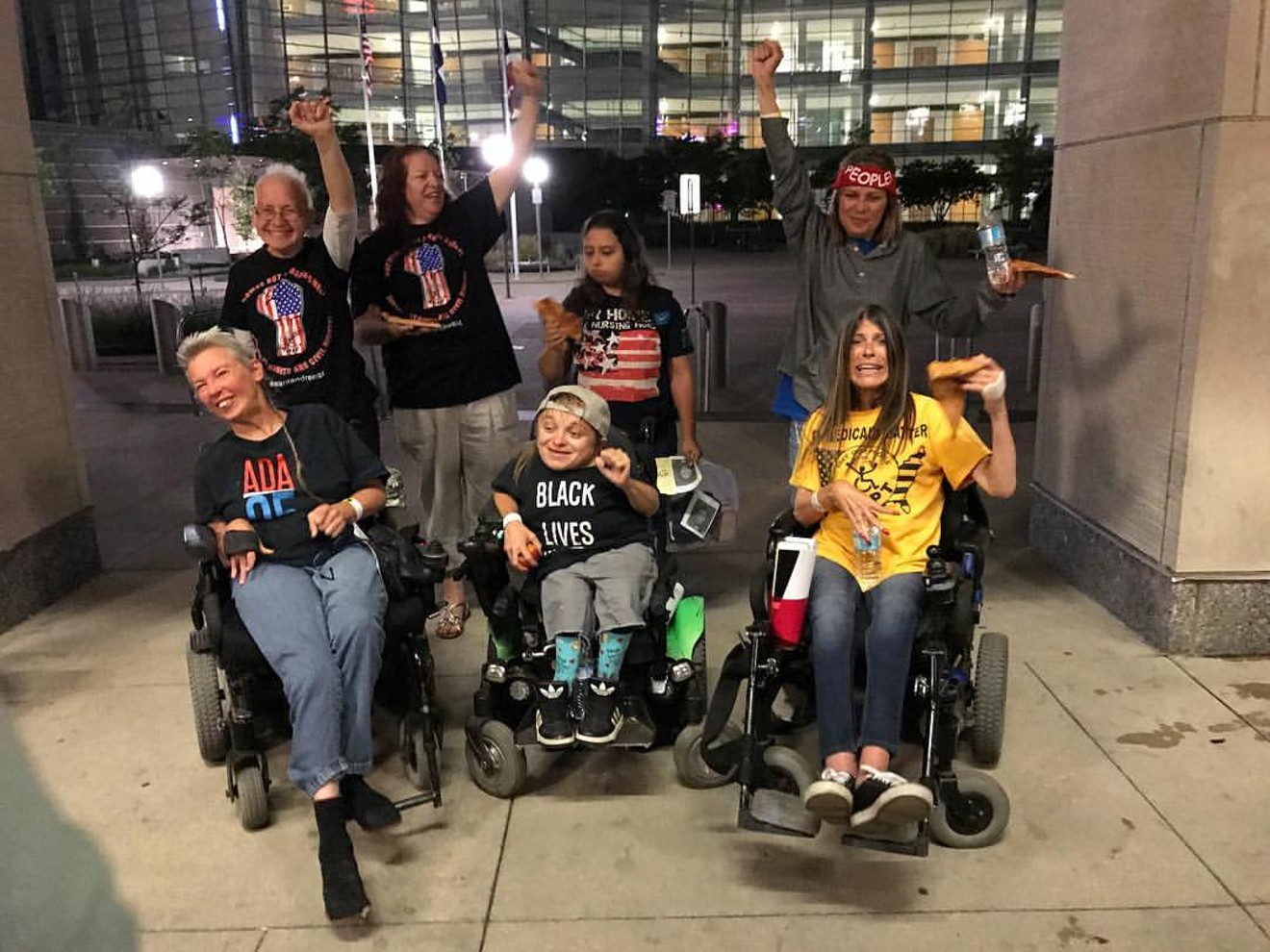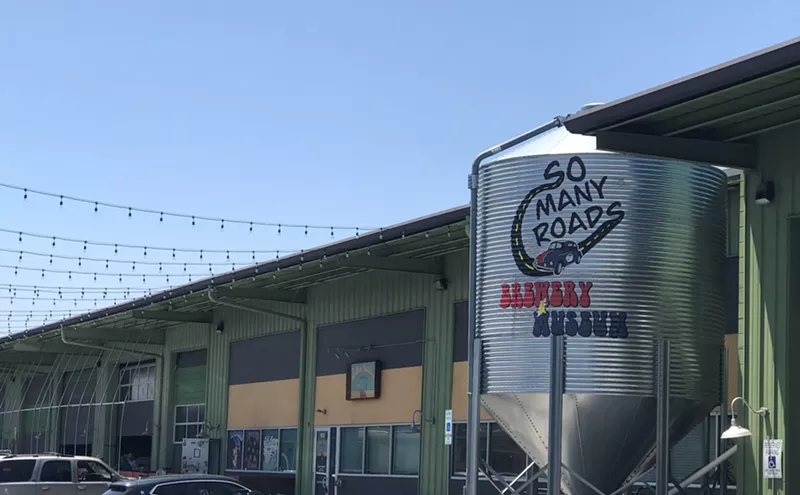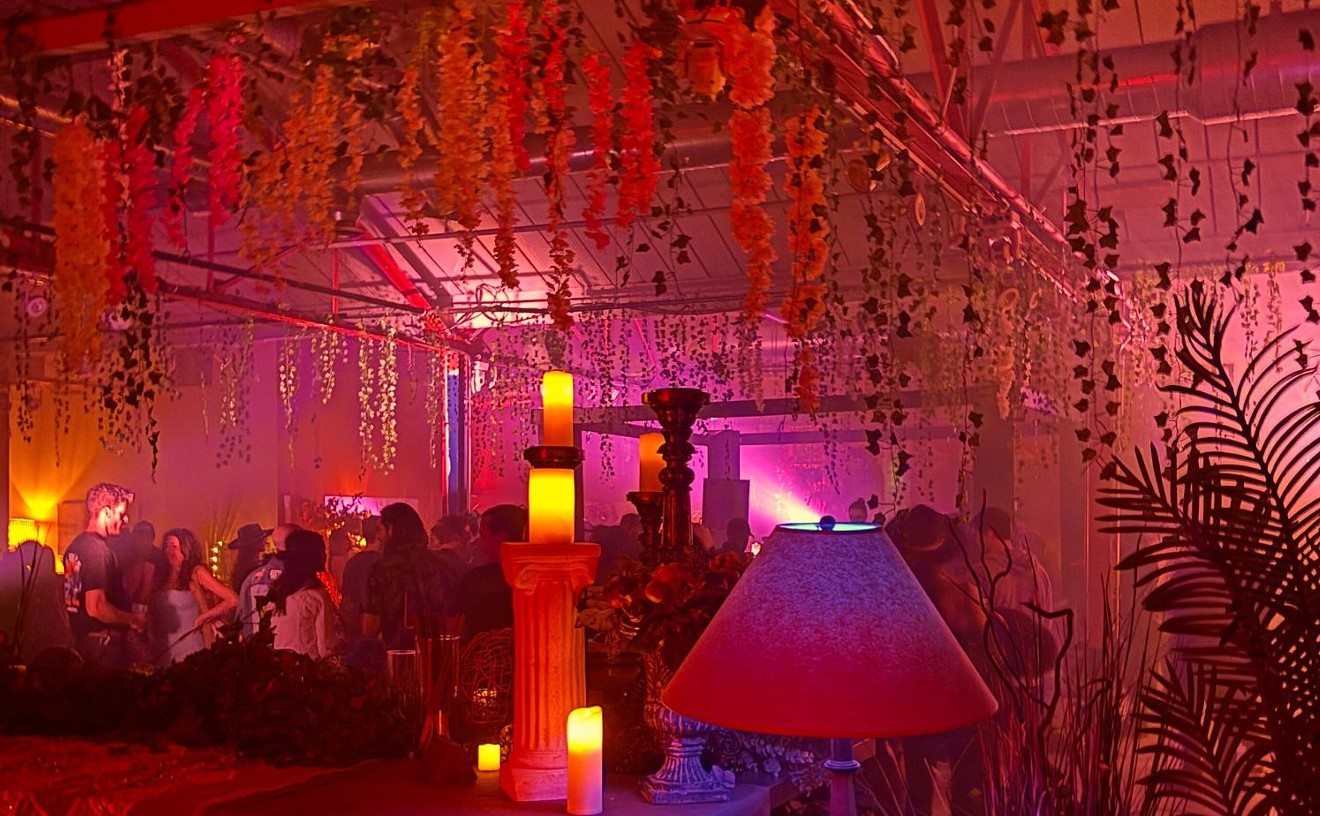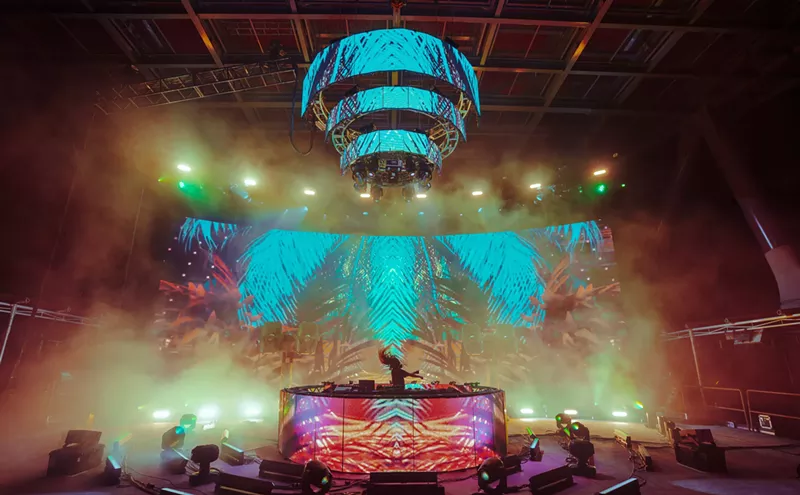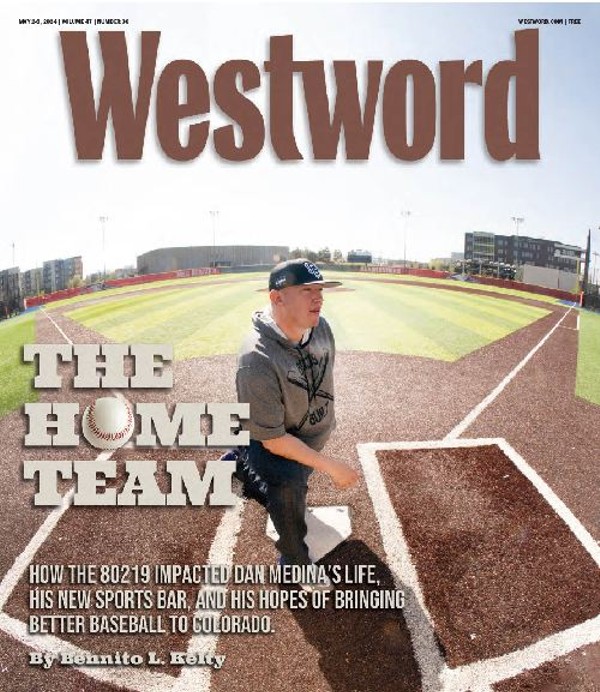Update July 9, 2017: Kalyn Heffernan's court date was moved to July 18, 2017.
Wheelchair Sports Camp MC Kalyn Heffernan had long known about ADAPT. The disability-rights group had used direct action to push the government to create broader accessibility, to advocate for health care and to free disabled people from nursing homes starting in the ’70s. The group began in Denver.
When Heffernan approached ADAPT a few days after the funeral of her friend disability activist Priscilla Carlson, the MC had no idea she would be participating in a three-day sit-in in U.S. Senator Cory Gardner's office, which was inspired by an ADAPT protest in Washington, D.C., where activists were dragged out of Senate Majority Leader Mitch McConnell's office.
The group demanded that the senator vote "no" on any federal cuts to Medicaid. After nearly sixty hours in his office, ten activists, including Heffernan, were arrested and spent roughly thirty hours in jail. Gardner never spoke with them.
Westword caught up with Heffernan to find out more about the action and her time in jail.
Westword: So you're out.
Kalyn Heffernan: I'm out. I'm free.
Let's start at the beginning. How did you wind up in Cory Gardner's office, and why?
I hit up ADAPT on Sunday night. I've been trying to get involved with ADAPT since I started Wheelchair Sports Camp. I just started learning the history. Dawn wrote me back and was like, "Can you come tomorrow?" I was like, "What's tomorrow?" "We're gonna be inside Cory Gardner's office. There's gonna be a group outside. There's going to be a group inside. We need more bodies inside. Can you get arrested?" "Yes." So I packed a bag. I didn't really know what was going on until the night before, Monday night. I packed a bag with a sweatshirt, a blanket, a water bottle and a notebook. I showed up.
This health care bill has obviously been on my mind. I've been trying to track what was going on nationally, what had happened in front of Mitch McConnell's office. I've also been really inspired and kept track of the disabled activists in Bolivia who are so radical and who hung their chairs from a bridge and rolled through the [Andes] just to get to the capital and camp there.
It's pretty interesting for me personally. Around a year ago, around the same time, I was kind of conflicted about my activism and activism in general and how intersectionality and inclusivity is such a big, hot topic right now. I've just felt like time and time again, disabled people are left out of the conversations. Queer disabled people of color face some of the most horrific forms of oppression. The scene is pretty active, and I'm not hearing the disabled community being represented, and I don't see them represented, and I'm realizing that I maybe haven't done enough.
This [sit-in] was kind of crazy timing. It was a no-brainer. I was like, "Yeah, I'm there."
I had been to Standing Rock pretty recently. There was a time where we were like, "Can we get arrested?" and I didn't feel like getting arrested in that situation would benefit anybody. It would be more like a badge of honor, which, you know, is lame activism to me, whereas this was like, "Oh, I'm needed." I didn't think twice about it. I didn't know what to expect. I didn't know how long we would be there. I didn't know if we would get arrested. I was prepared to, if need be. I just kinda went in.
I just lost a dear friend of mine who was a real champion for disabled advocacy. Her spirit was around the night before. It was pretty intense. It started snowballing into this thing that was getting a lot of attention. We were in touch with other activists across the country, getting updates on what was happening and who was being arrested. What we were doing was really important.
We went in, decided we're not leaving until we get a "no" [on the Republican health care bill] from Cory Gardner. That building has arrested these activists twice before, so we barely even got up, because the elevators are controlled by security, so you can't get to the fifth floor without them sending you to the fifth floor. We finally got up.
We got up, we were pretty fired up. We got a noise complaint. We had an option to continue to be rowdy and probably get evicted by building security or comply more and work toward getting some dialogue. We got a noise complaint from a tenant in the building. That building has so many gross corporate businesses: Chase Bank, Starbucks. There was a title insurance company next door to Cory Gardner's, and they really hated us. We got up there, and they wouldn't let us have access to the bathroom, and they pretended like they wanted to accommodate us. We could see the terror in their eyes, like, "Oh, God. What are we going to do?"
The cops came after the second noise complaint. A bunch of activists kept asking me to rap "It's Hard Out Here for a Gimp," so I did, a cappella [see the music video for the song below].
Then we got our second noise complaint, which is when the cops came for the first time. That was the first day that we were there.
We were prepared to get arrested, but they didn't really know what to do. They ended up waiting long enough that the building closed, and they decided to let us stay. Building security was cool that night and opened the door to the bathroom. It was this weird dynamic of figuring out who is our friend, depending on the day and the time and the person.
There were times when Cory Gardner's staff were more accommodating and talking to us like people, and there were other times where security was being way more accommodating and talking to us like humans, and Cory Gardner's staff was real salty. It was a dynamic of which security guard is cool, depending on the day, depending on the time.
We tried to be as cool as we could be. We got so much love and support from the community. We had food for days, and we were trying to feed security and trying to feed Cory Gardner's staff. Cory Gardner's staff ended up staying the night, which was so strange, because he was behind closed doors, where we couldn't even see him. There was not a way that he could help us or check for our safety. But we had offered him food and anything he needed. It was real strange, and again, we were chanting less while the building was in operation.
We were trying to play by the rules. We couldn't be in the hallway, which is hard when you have nine people, a lot of them in chairs. In order to get one wheelchair out of the room, you have to play Tetris and shuffle. You have to get a couple chairs out to get one chair out, and we would all go back in. That was against building rules.
We respected their noise violation, and then the day that we got arrested, that title [company's employees]... were not there. So they weren't there to make the complaint, which is interesting.
Of the three days, we might have been a little bit louder than the past two days. The people who had complained in the past weren't there. That title insurance company hired an extra security guard to literally sit on the couch inside a vacant office the whole day and night. Nobody was in there, and they hired a security guard. Building security hired an extra security guard.
Cory Gardner's staff had to pay his employee longer. We were like, "I hope you're getting overtime for this." He was like, "Nope. I'm not getting overtime." The joke was that as soon as we got a "no," we would stay in the office and demand that he get better wages for staying overnight.
Here's this simple solution of us just trying to work with them, and they're spending all this extra money for extra staff and security that aren't helping us, just giving us more rules. It's like, "Where is this money coming from? Can we just talk to Cory Gardner instead?" It's wild.
He never reached out, right?
Not personally. The first day, they denied us access to the bathroom. We had to figure out ways to go to the bathroom in the office. Security opened it as soon as the building closed. When Cory Gardner's staff showed up on Wednesday morning, the first thing they did was shut the bathroom. It was this chick Nicole and somebody else – two women that these protesters have been in contact with, and they know them by first name. They were so rude. They didn't talk to us. I offered them doughnuts, and they rolled their eyes at me. They were so pissed. We woke up and were like, "Oh, great. Cory Gardner's staff hates us again."
Then state director Andy [Merritt] shows up, and he acts like, "I want to work with you."
He took our thing we wanted Gardner to sign, that was like, "I, Senator Gardner, will not vote on anything that strips services, blah, blah, blah, blah, blah." He took that from us. He said he's in direct contact with [Gardner]. Andy says Gardner knows we are there. He wants to accommodate us. But he also wants to abide by the building rules.

ADAPT is demanding that Gardner sign this statement pledging to vote against any bill that would reduce Medicaid funding for seniors and people with disabilities.
Kalyn Heffernan
Gardner's staff showed up Thursday, and they didn't say a word to us then. That's the funny thing. We're in their office the whole time, but we didn't hardly see them, because they're behind closed doors.
Thursday, we had to lay on the buzzer to get Andy, the state director, out to give us an update, to be like, "Yo, we're still here. Are you going to talk to us? What's the deal?" That's when he told us the bill was being redrafted, which wasn't anywhere in the media yet, and he was going to do his best to get us more information on what that redraft looks like.
As far as Medicaid goes, we were very firm in our demand that they not strip services from Medicaid, most especially for long-term care, because that's the most expensive part of Medicaid.
He wrote it down again, pretending that he wanted to work with us. The way that we were evicted or whatever was super-shady. The building had just closed. I had a reporter text me: "Did you know that twelve cops just showed up?" Within twenty minutes, they were up there. That same state director, who in the morning was pretending he was there working with us, was like, "You have to leave for your safety, for your health, so we don't get evicted from the building, bullshit, bullshit, bullshit. You're trespassing. We're not going to let this happen anymore."
Wow.
We spent thirty hours in jail, and that's a whole other shady thing. We should definitely not have been in there that long.
What was that experience like, getting detained and spending time in jail?
Pretty shitty. [Laughs.] Pretty hellish. We spent sixteen hours in processing.
That's the worst.
That's the worst of it. There's no bed. It's freezing. Everybody has their arms inside of their shirts. Big or small, man or woman – it's freezing. Very intentionally uncomfortable. It's very intentional. And then all the benches are like airport benches that have the arm rests in between them, so you can't lay down. And they're all metal in a freezing room. So they're even more cold. Even people that would stand up and walk around were told to sit down. But we're in chairs, so most people had stayed in their chairs.
That was just hell in the processing area. And we got arrested at night, and we'd been holed up in an office for three days, so it's like, we're pretty ready to pass out. It's pretty impossible. They intentionally make it as terrible as they can. That took sixteen hours before we even got a chair. Us wheelchair users had asked to be in general population, that we did not need any special services or medical attention. They put us in the medical ward anyway, because of liability, because we are living liabilities. That pissed us off. I think it was okay in the long run, because the beds were hospitable beds, so they were a little bit nicer.
Generally speaking, the police inside and especially all the medical people were in strong support of what we did. The medical unit is interesting, because it's what they do to disabled people. It's basically solitary confinement for your own safety. So there's no common area; there's no way to really connect with other people or see other people except for the window of your cell.
A cop right on the way up to our cell had given us an update that the health care now was going to be Obamacare repealed but not replaced. That was the first update that we'd heard about that. When we got into medical, I tried to make a phone call to figure out why the hell we were still there. A disabled inmate came to the window: "I saw you on the news. Way to go." He asked the sheriff, "Did you see that? Do you know why they're here?" The sheriff was like, "Yeah, I know why they're here. They're here because they're fighting for their rights." That was the way we were being treated – not that they were being nice to us by any means, but they were also like, "We know why you're here, and way to go."
Yeah. It was interesting. People were out there overnight. There were people camping outside the jail till three in the morning, demanding answers, holding vigils, asking why we hadn't been released. The media was there. As soon as the media left, the sheriff came out and explained more. There were a lot of icky things. The mayor knew what was going on. People were in contact with the mayor's office and Hickenlooper's office. Gardner definitely knew what was going on. There were a bunch of state representatives there when we were released. We should have been out. We shouldn't have been there for thirty hours, for sure.
Imagining that on top of however many hours you were in the office – that's wild.
It's wild. Two full work weeks and overtime. And no window. I started going a little crazy.
What was the energy like between the people doing the sit-in?
It's funny. None of us had known each other. I didn't know anybody except Caryn Sodaro. I had known her from the Occupy days and a lot of things. We had just missed each other at Standing Rock. She was there the night that everybody got water-cannoned.
She stayed with us the whole time. She and I were the only ones that had known each other. That's not true. Carrie Ann Lucas and I were on the same lawsuit for Red Rocks. I knew her through that. Then Dawn Russell from ADAPT — I saw her but I didn't meet her. She was at my friend Priscilla Carlson's services, my friend who had just passed away.
It was interesting. It's like getting to know people in a really strange, quick way. We really got to know each other. I don't know how to do anything without talking shit and having fun. We made the best of it. We had fun.
The community was so awesome, coming in and out, bringing us things and visiting. I had to rehearse for this show. I didn't do anything, because my phone was so crazy. Wheelchair Sports Camp's Twitter handle was trending on Twitter for a minute there. I had 300 friend requests. We were live-streaming. It was just a lot. So much was going on. We were busy. We were all on the phones doing separate interviews with different people and figuring out things. Right before we got arrested, I was updating the press release.
We were staying busy, and we were still having fun – especially on the live-streams. That's a really cool new thing within activism. That's what brought me to Twitter was watching live streams from Tunisia at the beginning of the Arab Spring. So that's cool, because people are asking questions, and we're joking around. We had fun. We definitely bonded. We had a great time, and we had a lot of support. It was nice to have different people coming in and out, so it wasn't just us nine the whole time.
David Lane is representing you all now?
That's right.
What are you facing in terms of charges?
I don't know. I'm interested to see what happens. I would like to think they're going to drop the charges because it's all ridiculous, and it's ticketable offenses. I'm interested to see what happens with the interference charges. I think that's disputable. Interference for not telling cops how to use a wheelchair doesn't seem like interference to me.
And David Lane, he's great. He knows what he's doing. He's looking into why we were held so long. There might be charges against them for that and the way that things were handled. Someone said they weren't giving their badge numbers and name when we were arrested. I don't know what to expect. I didn't go into any of this with any expectations except, "We're here to do something, and we're not leaving until it gets done." We did what we could do for as long as we could, and now it's up to them on how to go further and how to charge us. I think Cory Gardner's staff and them are digging themselves a bigger hole. I think that the pressure and visibility toward his cowardice is only getting worse. Every step further, the way this has been handled is just shining light onto who he is as a senator.
At this point, what do you have to say to him?
Talk to us. Stop being such a coward. Stick by the Colorado people.
The original activists that became known as ADAPT are the reason that Medicaid exists in the first place. Disabled-rights history starts in Denver on a national level. That's why it's even more important for me to hold him accountable to these policies. We're the most progressive disabled-rights city in the country. We're the pioneers. We're the first.
It was 1975 that disabled people left their nursing home against medical will, and they forced the state to pay for those services outside of the nursing home, and that's what became Medicaid. He should understand that. He should know that. Denver disabled activists were the first people to put their bodies in front of the RTD on Colfax and Broadway, on the Fourth of July in 1978. That's why there's a law in the ADA that public transit has to provide bus lifts.
You know, that started here. Now we're still having to demand our basic human rights. We're not even asking for much. What we have with Medicaid is not the best. It's really hard to stay on Medicaid. It takes a lot of energy to be on Medicaid, and still not everything's covered. We're just asking to keep that? Come on. It's ridiculous. And it's so frustrating to see even some of my family members in the Westword article say we're asking for handouts or we're asking for something. It's like, no. We're demanding the right to live, the right to exist.
It costs the state more money to institutionalize us than to give us the care that we need independently. It's so frustrating. It's so, so frustrating. Medicaid has created jobs. Because we're able to live independently, we're able to contribute to society. We're able to pay taxes. You know?
The worst part about all of this for me is that all of this is going to and already does affect disproportionately under-served and marginalized communities within those marginalized communities. So, yeah, we're here representing disabled people. But we know that this is going to hit disabled people of color hard. It's going to strip from them first. It's going to be stripped from indigenous disabled people, immigrants, undocumented immigrants, queers. You add these other factors into the disability equation, and it's just exhausting. It's exhausting, and it's already so hard for us to survive and exist within such a capitalist society that this is attacking them first. They're already under attack. We're just trying to hold on to the little stuff that we have still and making sure that these communities get their basic rights met.
I'm curious how your platform as a musician played into your role in the sit-in.
All this activism stuff happened because of my music – especially the disability community. I got way more connected because of my music. Just this last tour we went on, we went to the Northwest, which is an area that we don't have any history of touring. More disabled people came out than I've ever seen. It was this ah-ha moment where we realized that people are listening, this is important, and what you're doing is important. I didn't start any of this rapping for that. It just kind of led me here.
I feel like everything has just manifested into each other, and I'm happy. I was so happy to be there as a musician and as someone who has been an activist for so many other marginalized communities, that I could kind of try and bring it all together. I'm kind of now a public figure separately, but it all goes back to I'm still disabled.
The band is Wheelchair Sports Camp. It has a wheelchair in the name. I'm in a wheelchair. I can't ignore it or push it aside, and I never have.
When I started Wheelchair Sports Camp, I was hesitant to get involved with disability groups, because I didn't want to be boxed in as a female crippled rapper. To me, I was a rapper. I didn't want to be marginalized by my identity. And now I realize how important those identities are to what got me here.
I am so happy, and I have been for a really long time. It's been a slow thing. It's a learning process for me, too. I think all of us activists are never going to be fully right on everything. We have to learn from each other about how to better represent each other. I've had to learn how to better represent the disabled community, my language, how I speak on things. So much has come to my awareness that I would have not had any access to without my band. All this has happened because I rap. That's crazy to me.
I feel really great. People are like, "Are you okay?" I'm like, "I haven't felt this good in a really long time." It's [another] of those ah-ha moments. I think, as an artist in general, I have a lot of self-doubt with everything. It's just part of being an artist. Within activism, it's so hard to care about humans all the time, because it's exhausting. I'm also having to fight to live and be treated in a way that I think I need to be. So it can be really exhausting.
My whole life can be a mindfuck, and this was one of those things that was like, no, this all matters. This has led you here. You're in the right place. Everything is in the right place, and this is what you were called to do. I didn't really choose any of this; it definitely chose me. I'm happy that I have a platform now, that it matters. Even a few years ago, if I was in that same room, I might not have the same attention. Because I'm privileged enough to have toured extensively now, done my work and paid my dues, now I'm in a place where what I say gets attention. That's really exciting when I can use it to support my community. That's all I could ever ask for. That's more important to me than anything. That's the most beautiful part about me doing music, is that it has been able to lend itself to the community.
How much did the music community show up around this action?
Quite a bit. When I was released, I was the first one to be released. There were definitely people from the music community there. There were at least 100 people there. It was crazy. From what I understand, there were more people there earlier. It came and went; people would come and leave and come and leave. So the crowd grew and dwindled and grew. But when I got out, there were definitely people from the music community.
Denver is a really special place. I've always felt it, and I've never known why I felt it, because I'm biased, and I was born here. But there is – especially after traveling – there is something really special about Denver. And our music community, when we tour, we're so snobby. We have such high expectations for music.
Even being at the Westword Showcase last weekend, it's another one of those reminders — like, damn, we have some of the best music here. It's so exciting to be in Denver still. It's been like this. I know we're all trying to hold on and protect our communities, and that's exciting, too, because we are. We're doing what we have to do, and obviously money still rules all right now, but it's not going to happen without a fight.
There is so much history here in Denver in activism. This is the capital of the Chicano movement. This is the capital of the disabled-rights movement. It's really amazing. Our Martin Luther King parade is one of the biggest in the country. We have 30,000 people face the mayor and demand accountability for police brutality. That doesn't happen everywhere. It's a really special place, and the music scene is a really special community here that I'm really fortunate to have been a part of. Now we are traveling a lot, and we are reminded everywhere we go that what we have here is really special and unique, and such a weird, great place to be creative.
What's next with Gardner?
We want to meet with him face to face, obviously. We still want a "no" on anything that's going to gut our services. That hasn't changed one bit, and we will continue to put all the pressure on him that we can.
Our court date is at 8 o'clock in the morning on July 6, and there will be a rally starting at 11 a.m. in front of Gardner's office. I don't know if we'll be allowed back in, but I might try. We're still very steadfast in our demand of keeping us disabled people alive in this state and nationally. It's gross. It's already really, really hard out here for a gimp. It gets harder, and it's been harder.
We've come a long way in a short amount of time. In 1975, when all disabled people were institutionalized, that's not that long ago. That's not that long ago at all.
We're not done with him until he does his best for the people who voted for him – which was not me, by the way. Jesus Christ. I'm not surprised at the way all this has been handled. I know enough of who Cory Gardner is to know that he represents white male privileged money. The weekend before we showed up, he was at a retreat with the Koch brothers at the Broadmoor in brutal Colorado Springs. You had to be a donor of $100,000 or more to attend.
These are the people that are making these policies and controlling our health care. It's so gross. It's so gross. I'm not surprised, but just because that's who he is doesn't mean it's okay.
Nobody can be surprised by what this Trump guy is doing, because he ran on all these things that were lies – and blatant truths about what a piece of shit he is. But we still have to hold him accountable to what we need and what we deserve. We're the richest country in the world, but there's no reason everybody shouldn't have health care and education. It's just absurd.
Anything else you want to speak to?
If you can, come to our court date. It's July 6 at 8 a.m. Come to our court date and come to that rally right after. We need all the support we can get. This is a unique movement, because it's going to affect all of us already disabled people, and disabled people of color, and indigenous disabled people first. But everybody gets sick. Everybody needs health care. Accidents happen. People get old. People become crippled. It's for everybody. We are doing this for everybody. We know who it's going to affect first and hardest, but it will affect everybody some day.
Disability Community to Rally to Save Medicaid, 11 a.m. July 6, Senator Cory Gardner's Denver office, 1125 17th Street, 303-839-1775.

